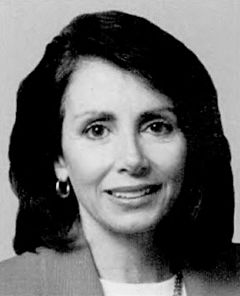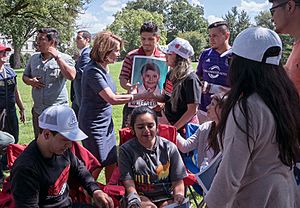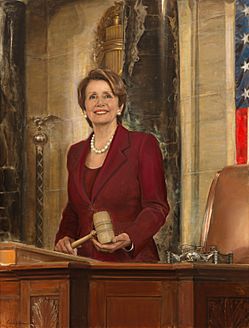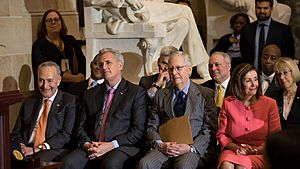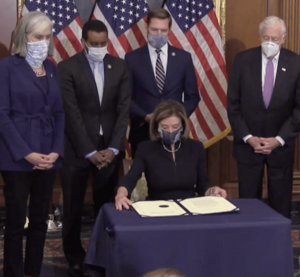Nancy Pelosi facts for kids
Quick facts for kids
Nancy Pelosi
|
|
|---|---|
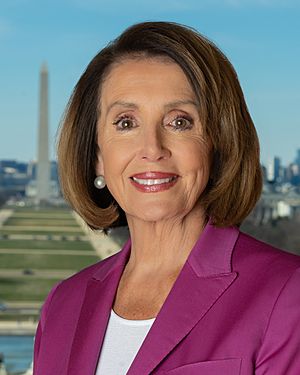
Official portrait, 2019
|
|
| 52nd Speaker of the United States House of Representatives | |
| In office January 3, 2019 – January 3, 2023 |
|
| Preceded by | Paul Ryan |
| Succeeded by | Kevin McCarthy |
| In office January 4, 2007 – January 3, 2011 |
|
| Preceded by | Dennis Hastert |
| Succeeded by | John Boehner |
| House Minority Leader | |
| In office January 3, 2011 – January 3, 2019 |
|
| Whip | Steny Hoyer |
| Preceded by | John Boehner |
| Succeeded by | Kevin McCarthy |
| In office January 3, 2003 – January 3, 2007 |
|
| Whip | Steny Hoyer |
| Preceded by | Dick Gephardt |
| Succeeded by | John Boehner |
| Leader of the House Democratic Caucus | |
| In office January 3, 2003 – January 3, 2023 |
|
| Deputy | Steny Hoyer |
| Preceded by | Dick Gephardt |
| Succeeded by | Hakeem Jeffries |
| House Minority Whip | |
| In office January 15, 2002 – January 3, 2003 |
|
| Leader | Dick Gephardt |
| Preceded by | David Bonior |
| Succeeded by | Steny Hoyer |
| Member of the U.S. House of Representatives from California |
|
| Assumed office June 2, 1987 |
|
| Preceded by | Sala Burton |
| Constituency |
|
| Chair of the California Democratic Party | |
| In office February 27, 1981 – April 3, 1983 |
|
| Preceded by | Richard J. O'Neill |
| Succeeded by | Peter Kelly |
| Personal details | |
| Born |
Nancy Patricia D'Alesandro
March 26, 1940 Baltimore, Maryland, U.S. |
| Political party | Democratic |
| Spouse | |
| Children | 5, including Christine and Alexandra |
| Parent |
|
| Relatives | Thomas D'Alesandro III (brother) |
| Residences | San Francisco, California, U.S. |
| Education | Trinity College, Washington (BA) |
| Awards | Presidential Medal of Freedom (2024) |
| Signature | |
Nancy Patricia Pelosi (/pəˈloʊsi/ pə-LOH-see; née D'Alesandro; born March 26, 1940) is an American politician who was the 52nd speaker of the United States House of Representatives, serving from 2007 to 2011 and again from 2019 to 2023. A member of the Democratic Party, she was the first woman elected as U.S. House Speaker and the first woman to lead a major political party in either chamber of Congress, leading the House Democrats from 2003 to 2023. A member of the House since 1987, Pelosi currently represents California's 11th congressional district, which includes most of San Francisco. She is the dean of California's congressional delegation.
Pelosi was born and raised in Baltimore, and is the daughter of mayor and congressman Thomas D'Alesandro Jr. She graduated from Trinity College, Washington, in 1962 and married businessman Paul Pelosi the next year; the two had met while both were students. They moved to New York City before settling down in San Francisco with their children. Focused on raising her family, Pelosi stepped into politics as a volunteer for the Democratic Party in the 1960s. After years of party work, rising to chair the state party, she was first elected to Congress in a 1987 special election and is now in her 20th term. Pelosi steadily rose through the ranks of the House Democratic Caucus to be elected House minority whip in 2001 and elevated to House minority leader a year later, becoming the first woman to hold each of those positions in either chamber of Congress.
In the 2006 midterm elections, Pelosi led the Democrats to a majority in the House for the first time in 12 years and was subsequently elected Speaker, becoming the first woman to hold the office. Until Kamala Harris became vice president in 2021, Pelosi was the highest-ranking woman in the presidential line of succession in U.S. history, as the speaker of the House is second in the line of succession. During her first speakership, Pelosi was a major opponent of the Iraq War as well as the Bush administration's attempts to partially privatize Social Security. She participated in the passage of the Obama administration's landmark bills, including the Affordable Care Act, the Dodd–Frank Wall Street Reform and Consumer Protection Act, the Don't Ask, Don't Tell Repeal Act, the American Recovery and Reinvestment Act of 2009, and the 2010 Tax Relief Act. Pelosi lost the speakership after the Republican Party retook the majority in the 2010 midterm elections, but she retained her role as leader of the House Democrats and became House minority leader for a second time.
In the 2018 midterm elections, Democrats regained majority control of the House, and Pelosi was again elected Speaker, becoming the first former speaker to reclaim the gavel since Sam Rayburn in 1955. During her second speakership, the House twice impeached President Donald Trump, first in December 2019 and again in January 2021; the Senate acquitted Trump both times. She participated in the passage of the Biden administration's landmark bills, including the American Rescue Plan Act of 2021, the Infrastructure Investment and Jobs Act, the CHIPS and Science Act, the Inflation Reduction Act of 2022, and the Respect for Marriage Act. In the 2022 midterm elections, Republicans narrowly regained control of the House for the new Congress, ending her tenure as speaker. She subsequently retired as House Democratic leader. On November 29, 2022, the Steering and Policy Committee of the House Democratic Caucus named Pelosi "Speaker Emerita".
Contents
- Early life and education
- Early career
- Early House of Representatives tenure
- First tenure as minority leader (2003–2007)
- First speakership (2007–2011)
- Second tenure as minority leader (2011–2019)
- Second speakership (2019–2023)
- Continued House tenure (2023–present)
- House committee assignments and caucus memberships
- Role as a Democratic Party fundraiser
- Political positions
- Electoral history
- Personal life
- Books
- Honors and decorations
- See also
Early life and education
Nancy Pelosi was born in Baltimore, Maryland, to an Italian-American family. She was the only daughter and the youngest of seven children of Annunciata M. "Nancy" D'Alesandro (née Lombardi) and Thomas D'Alesandro Jr. Her mother was born in Fornelli, Isernia, Molise, in Southern Italy, and immigrated to the U.S. in 1912; her father traced his Italian ancestry to Genoa, Venice and Abruzzo. When Pelosi was born, her father was a Democratic congressman from Maryland. He became Baltimore mayor seven years later. Pelosi's mother was also active in politics, organizing Democratic women and teaching her daughter political skills. Pelosi's brother, Thomas D'Alesandro III, also a Democrat, was elected Baltimore City Council president and later served as mayor from 1967 to 1971.
Pelosi helped her father at his campaign events, and she attended President John F. Kennedy's inaugural address in January 1961.
In 1958, Pelosi graduated from the Institute of Notre Dame, an all-girls Catholic high school in Baltimore. In 1962, she graduated from Trinity College in Washington, D.C., with a Bachelor of Arts in political science. Pelosi interned for Senator Daniel Brewster (D-Maryland) in the 1960s alongside future House Majority Leader Steny Hoyer.
Early career
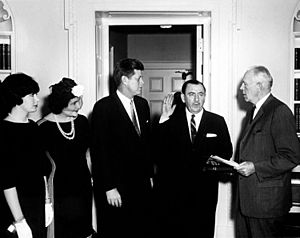
After moving to San Francisco, Pelosi became friends with 5th district congressman Phillip Burton and began working her way up in Democratic politics. In 1976, she was elected as a Democratic National Committee member from California, a position she would hold until 1996. She was elected as party chair for Northern California in 1977, and four years later was selected to head the California Democratic Party, which she led until 1983. Subsequently, Pelosi served as the San Francisco Democratic National Convention Host Committee chairwoman in 1984, and then as Democratic Senatorial Campaign Committee finance chair from 1985 to 1986.
Early House of Representatives tenure
Phillip Burton died in 1983 and his wife, Sala Burton, won a special election to fill the remainder of her husband's congressional term. She was then reelected to two more terms in her own right. Burton became ill with cancer in late 1986 and decided not to run for reelection in 1988. She wanted Pelosi to succeed her, guaranteeing Pelosi the support of the Burtons' contacts. Burton died on February 1, 1987, one month after being sworn in for a second full term. Pelosi won the special election to succeed her, defeating Democratic San Francisco supervisor Harry Britt on April 7, 1987, and Republican Harriet Ross in a June 2 runoff. Pelosi took office a week later. In the primary, Britt, a gay man, had courted San Francisco's sizable homosexual population by arguing that he would be a better than Pelosi at addressing the HIV/AIDS epidemic.
Pelosi has continued to represent approximately the same area of San Francisco for her entire congressional career, despite the boundaries shifting marginally in decennial post-reapportionment redistrictings. This area has been represented in the House by Democrats uninterruptedly since 1949, and is strongly Democratic-leaning (as of 2006, 13% of registered voters in the boundaries of Pelosi's district were Republican). It has not seen a serious Republican congressional contender since the early 1960s. Pelosi has been reelected to the House 18 times without any substantive opposition. Unlike in her 1987 campaign, Pelosi has not participated in candidates' debates in her reelection campaigns. In her first seven reelection campaigns (from 1988 through 2004), she won an average of 80% of the vote.
At the time that Pelosi entered office, there were only 23 women in the House.
When Pelosi entered office, the AIDS epidemic was at a dire point. San Francisco was greatly affected; its large population of gay men was the epidemic's initial epicenter. Beginning in her first term, Pelosi became a prominent congressional advocate on behalf of those impacted by HIV/AIDS. Shortly after she took office, she hired a gay man as her congressional office's director of AIDS policy. In her first floor speech, Pelosi promised that she would be an advocate in the fight against what she called "the crisis of AIDS." With great stigma around the subject, some in her party privately chastised her for publicly associating herself with it. Pelosi co-authored the Ryan White CARE Act, which allocated funding dedicated to providing treatment and services for this impacted by HIV/AIDS. President George H. W. Bush signed the bill into law in December 1990.
In March 1988, Pelosi voted for the Civil Rights Restoration Act of 1987 (as well as to override President Ronald Reagan's veto).
In 2001, Pelosi was elected the House minority whip, second-in-command to Minority Leader Dick Gephardt. She was the first woman in U.S. history to hold that post. Pelosi defeated John Lewis and Steny Hoyer for the position. A strong fundraiser, she used campaign contributions to help persuade other members of Congress to support her candidacy.
In 2002, Pelosi opposed the Iraq Resolution authorizing President George W. Bush to use military force against Iraq, which passed the House on a 296–133 vote. She said, "unilateral use of force without first exhausting every diplomatic remedy and other remedies and making a case to the American people will be harmful to our war on terrorism."
First tenure as minority leader (2003–2007)
In November 2002, after Gephardt resigned as House minority leader to seek the Democratic nomination in the 2004 presidential election, Pelosi was elected to replace him, becoming the first woman to lead a major party in either chamber of Congress. In the campaign to succeed Gephardt as the House Democratic Caucus's leader, Pelosi was challenged by Harold Ford Jr. and Marcy Kaptur. Kaptur withdrew her candidacy for the position before the November 15, 2003, caucus vote, and Pelosi defeated Ford 117–29 in the closed-door vote of caucus members. Critics of Pelosi characterized her as too liberal to be a successful House leader.
As minority leader, Pelosi sharply criticized the handling of the Iraq War by President Bush and his administration, in 2004 saying Bush had demonstrated areas of "incompetence".
In a relative surprise, the Democratic Party lost three seats in the 2004 House elections, which coincided with Bush's reelection as president. Focused on retaking the House majority in 2006, in her second term as minority leader Pelosi worked to criticize the Bush administration more effectively and to contrast the Democratic Party with it. As part of this, Pelosi voiced even harsher criticism of Bush's handling of the Iraq War. In November 2005, prominent congressional Democrat John Murtha proposed that the U.S. begin a withdrawal of troops from Iraq at the "earliest predictable date". Pelosi initially declined to commit to supporting Murtha's proposal. Speaker Dennis Hastert soon brought to the floor a vote on a non-binding resolution calling for an immediate withdrawal of troops, seeking to trap Democrats into taking a more radical stance. But Pelosi led Democrats in voting against the resolution, which failed in a 403–3 floor vote. Roughly two weeks later, Pelosi held a press conference in which she endorsed Murtha's proposal. Some critics believed that Pelosi's support for a troop withdrawal would prevent the Democrats from winning a House majority in the 2006 elections.
During her time as minority leader, Pelosi was not well-known to much of the American public. Before the 2006 elections, Republicans made a concerted effort to taint public perception of her, running advertisements assailing her. Advertisements demonizing Pelosi became a routine part of Republican advertising in subsequent elections. For instance, during the 2022 election cycle, Republicans ran more than $50 million in ads that negatively characterized or invoked Pelosi, and in the 2010 cycle, they spent more than $65 million on such ads.
First speakership (2007–2011)
2007 speakership election
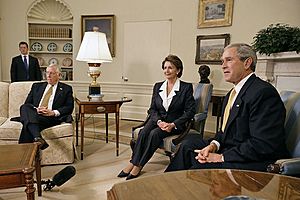
In the 2006 elections, the Democrats took control of the House, picking up 30 seats, the party's largest House seat gain since the 1974 elections, in the wake of the Watergate scandal. The party's House majority meant that as minority leader, Pelosi was widely expected to become speaker in the next Congress. On November 16, 2006, the Democratic caucus unanimously nominated her for speaker.
Pelosi supported her longtime friend John Murtha for House majority leader, the second-ranking post in the House. His competitor was House Minority Whip Steny Hoyer, who had been Pelosi's second-in-command since 2003. Hoyer was elected House majority leader over Murtha by a margin of 149–86.
On January 4, 2007, Pelosi defeated Republican John Boehner of Ohio, 233 votes to 202, in the election for speaker of the House.
Rahm Emanuel, the incoming chairman of the House Democratic Caucus, nominated Pelosi, and her longtime friend John Dingell swore her in, as the dean of the House of Representatives traditionally does.
Pelosi was the first woman, the first Californian, and the first Italian-American to hold the speakership. She was also the second speaker from a state west of the Rocky Mountains. The first was Washington's Tom Foley, the last Democrat to hold the post before Pelosi.
As speaker, Pelosi remained the leader of the House Democrats, as the speaker is considered the leader of the majority caucus. But by tradition, she did not normally participate in debate and almost never voted on the floor, though she had the right to do so as a member of the House. She was also not a member of any House committees, also in keeping with tradition.
Pelosi was reelected speaker in 2009.
Public perception
During and after her first tenure as speaker, Pelosi was perceived and/or characterized as a contentious political figure. Republican candidates often associated their Democratic opponents with her. Pelosi became the focus of heavy disdain by "mainstream" Republicans and Tea Party Republicans alike, as well as from the left.
As they had in 2006, Republicans continued to run advertisements that demonized Pelosi. Before the 2010 House elections, the Republican National Committee prominently used a "Fire Pelosi" slogan in its efforts to recapture the House majority. This slogan was rolled out hours after the House passed the Patient Protection and Affordable Care Act. Republicans spent $65 million ahead of the 2010 elections on anti-Pelosi advertisements. Pelosi has continued to be a fixture of Republican attack. Ads demonizing her have been credited with fostering intense right-wing ire toward her, and have been seen as one of the top factors in her unpopularity.
Social Security
Shortly after being reelected in 2004, President Bush claimed a mandate for an ambitious second-term agenda and proposed reforming Social Security by allowing workers to redirect a portion of their Social Security withholding into stock and bond investments. Pelosi strongly opposed the plan, saying there was no crisis, and as minority leader she imposed intense party discipline on her caucus, leading them to near-unanimous opposition to the proposal, which was defeated.
Blocking of impeachment proceedings against President Bush
In the wake of Bush's 2004 reelection, several leading House Democrats believed they should pursue impeachment proceedings against him, asserting that he had misled Congress about weapons of mass destruction in Iraq and violated Americans' civil liberties by authorizing warrantless wiretaps.
In May 2006, with an eye on the upcoming midterm elections—which offered the possibility of Democrats taking back control of the House for the first time since 1994—Pelosi told colleagues that, while the Democrats would conduct vigorous oversight of Bush administration policy, an impeachment investigation was "off the table". A week earlier, she had told The Washington Post that although Democrats would not set out to impeach Bush, "you never know where" investigations might lead.
After becoming speaker in 2007, Pelosi held firm against impeachment, notwithstanding strong support for it among her constituents. In the 2008 election, she withstood a challenge for her seat by antiwar activist Cindy Sheehan, who ran as an independent primarily because of Pelosi's refusal to pursue impeachment.
The "Hundred Hours"
Before the midterm elections, Pelosi announced that if Democrats gained a House majority, they would push through most of their agenda during the first 100 hours of the 110th Congress.
The "first hundred hours" was a play on President Franklin D. Roosevelt's promise for quick action to combat the Great Depression during his "first hundred days" in office. Newt Gingrich, who became speaker of the House in 1995, had a similar 100-day agenda to implement his Contract with America.
Opposition to Iraq War troop surge of 2007
On January 5, 2007, reacting to suggestions from Bush's confidants that he would increase troop levels in Iraq (which he announced in a speech a few days later), Pelosi and Senate Majority Leader Harry Reid condemned the plan. They sent Bush a letter reading:
[T]here is no purely military solution in Iraq. There is only a political solution. Adding more combat troops will only endanger more Americans and stretch our military to the breaking point for no strategic gain. ... Rather than deploy additional forces to Iraq, we believe the way forward is to begin the phased redeployment of our forces in the next four to six months while shifting the principal mission of our forces there from combat to training, logistics, force protection, and counter-terror.
2008 Democratic National Convention
Pelosi was named Permanent Chair of the 2008 Democratic National Convention in Denver, Colorado.
Healthcare reform
Pelosi has been credited for spearheading Obama's health care law, the Affordable Care Act, when it seemed doomed to defeat. After Republican Scott Brown won Democrat Ted Kennedy's former Senate seat in the January 2010 Massachusetts special election, costing Democrats their filibuster-proof majority, Obama agreed with his then chief of staff Rahm Emanuel's idea to do smaller initiatives that could pass easily. But Pelosi dismissed Obama's compunction, mocking his scaled-back ideas as "kiddie care". After convincing him that this was their only shot at health care reform because of the large Democratic majorities in Congress, she rallied her caucus as she began an "unbelievable marathon" of a two-month session to craft the bill, which passed the House 219–212. In Obama's remarks before signing the bill into law, he called Pelosi "one of the best speakers the House of Representatives has ever had."
Assessments of first speakership
By early 2010, analysts were assessing Pelosi as possibly the most powerful woman in U.S. history and among the most powerful speakers of the previous 100 years. Later in 2010, Gail Russell Chaddock of the Christian Science Monitor opined that Pelosi was the "most powerful House speaker since Sam Rayburn a half century ago", adding that she had also been "one of the most partisan". Pelosi's first speakership was favorably assessed by scholars. In late 2010, Norman Ornstein, a congressional scholar at the conservative-leaning American Enterprise Institute, opined that despite polarized public opinion of Pelosi, "she's going to rank quite high in the pantheon of modern speakers", declaring that the only speaker of the previous 100 years that he would rank higher than Pelosi was Sam Rayburn. Catholic University of America political scientist Matthew Green opined that 111th Congress had "been remarkable in its productivity—in both the number of bills enacted and their scope—and Pelosi shares much of the credit."
In November 2010, after Democrats lost their House majority, Politico writer John Bresnahan called Pelosi's record as speaker "mixed". He opined that Pelosi had been a powerful speaker, describing her as wielding "an iron fist in a Gucci glove" and having held "enormous power within the House Democratic Caucus", but noting that she had a "horrible approval rating with the rest of America". Bresnahan wrote that Pelosi's leadership and the legislative agenda she advanced had significantly contributed to the party's loss of its House majority, citing the Patient Protection and Affordable Care Act as an example of legislation that hurt the Democrats electorally in 2010. Bresnahan also believed that, ahead of the 2010 elections, Pelosi had "disastrously" misread public opinion, and that Pelosi had been a poor orator.
Thomas Mann of the Brookings Institution later opined that Pelosi had been the "strongest and most effective speaker of modern times" during her first speakership.
Draper also wrote that "for all her mastery of Washington’s inside game, Pelosi has never been a deft public-facing politician," and called her a poor orator.
Second tenure as minority leader (2011–2019)
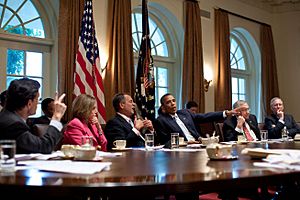
112th and 113th Congress
Though Pelosi was reelected by a comfortable margin in the 2010 elections, the Democrats lost 63 seats and control of the House of Representatives to the Republicans. After this setback, Pelosi sought to continue leading the House Democratic Caucus as minority leader, the office she held before becoming speaker. Intraparty opposition failed to pass a motion to delay the leadership vote, though she faced a challenge from Representative Heath Shuler. Shuler lost to Pelosi, 150–43, in the caucus vote on November 17, 2010. On the opening day of the 112th Congress, Pelosi was elected minority leader.
In November 2011, 60 Minutes alleged that Pelosi and several other members of Congress had used information they gleaned from closed sessions to make money on the stock market. The program cited her purchases of Visa Inc. stock while a bill that would limit credit card fees was in the House. Pelosi denied the allegations and called the report "a right-wing smear". When the Stop Trading on Congressional Knowledge Act (or STOCK Act) was introduced the next year, she voted for it and lauded its passing. Of representatives Louise Slaughter and Tim Walz, who drafted the bill, Pelosi said they "shined a light on a gaping hole in our ethics laws and helped close it once and for all".
On November 14, 2012, she announced she would remain Democratic leader.
114th and 115th Congress
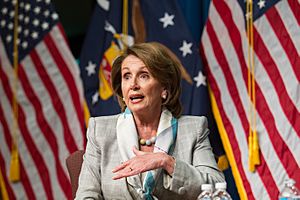
At times, centrists, progressive candidates and incumbent Democrats all expressed opposition to Pelosi's continued tenure as the party's House leader.
Prompted by colleagues after the 2016 presidential election, Tim Ryan of Ohio initiated a bid to replace Pelosi as House minority leader on November 17, 2016. After Pelosi agreed to give more leadership opportunities to junior members, she defeated Ryan by a vote of 134–63 on November 30.
In 2017, after Democrats lost four consecutive special elections in the House of Representatives, Pelosi's leadership was again called into question. In June 2017, Representative Kathleen Rice of New York and a small group of other House Democrats, including Congressional Black Caucus chairman Cedric Richmond, held a closed-door meeting to discuss potential new Democratic leadership. Other House Democrats, including Ryan, Seth Moulton, and Filemon Vela, publicly called for new House leadership. In an interview, Rice said, "If you were talking about a company that was posting losing numbers, if you were talking about any sports team that was losing time and time again, changes would be made, right? The CEO out. The coach would be out and there would be a new strategy put in place." In a press conference, Pelosi defended her leadership, saying, "I respect any opinion that my members have but my decision about how long I stay is not up to them." When asked specifically why she should stay on as House minority leader after numerous Democratic seats were lost, she responded, "Well, I'm a master legislator. I am a strategic, politically astute leader. My leadership is recognized by many around the country, and that is why I'm able to attract the support that I do."
In February 2018, Pelosi broke the record for longest House speech using the "magic minute" custom when she spent more than eight hours recounting stories from DREAMers—people brought to the United States as minors by undocumented immigrants—to object to a budget deal that would raise spending caps without addressing the future of DACA recipients, who were at risk of deportation by the Trump administration.
In May 2018, after the White House invited two Republicans and no Democrats to a Department of Justice briefing on an FBI informant who had made contact with the Trump campaign, Pelosi and Schumer sent a letter to Deputy Attorney General Rod Rosenstein and FBI director Wray calling for "a bipartisan Gang of Eight briefing that involves congressional leadership from both chambers".
In August 2018, Pelosi called for Duncan D. Hunter's resignation after his indictment on charges of misusing at least $250,000 in campaign funds, saying the charges were "evidence of the rampant culture of corruption among Republicans in Washington today".
In April 2018, Peter Beinart wrote in The Atlantic that Pelosi had been "the most effective congressional leader of modern times—and, not coincidentally, the most vilified."
Second speakership (2019–2023)
In the 2018 elections, the Democrats recaptured a House majority, gaining 41 seats. This was the party's largest gain in the House since the 1974 post-Watergate elections. On November 28, House Democrats nominated Pelosi to once again serve as speaker. She was reelected to the speakership at the start of the 116th Congress on January 3, 2019. Pelosi "clinched the speakership after weeks of whittling down opposition from some fellow Democrats seeking a new generation of leadership. The deal to win over holdouts put an expiration date on her tenure: she promised not to stay more than four years in the job". 220 House Democrats voted for Pelosi as Speaker and 15 for someone else or no one.
On February 4, 2020, at the conclusion of Trump's State of the Union address, Pelosi tore up her official copy of it. Her stated reason for doing so was "because it was a courteous thing to do considering the alternatives. It was a such a dirty speech". Trump and other Republicans criticized her for this.
In December 2021, Pelosi announced her candidacy for reelection to the House in 2022. In 2018, and again in 2020, she had agreed not to stay on as speaker beyond January 2023, but otherwise avoided questions about her future. In 2022, Pelosi was reelected, but the Democratic Party lost the House majority. Ten days later, she announced that she would not seek a Democratic leadership post in the next Congress.
2018–2019 government shutdown
At the start of the 116th Congress, Pelosi opposed Trump's attempts to use the 2018–2019 federal government shutdown (which she called a "hostage-taking" of civil servants) as leverage to build a substantial wall on the U.S.-Mexico border. She declined to allow Trump to give the State of the Union Address in the House chamber while the shutdown was ongoing. After several polls showed Trump's popularity sharply falling due to the shutdown, on January 25, 2019, Trump signed a stopgap bill to reopen the government without any concessions regarding a border wall for three weeks to allow negotiations on an appropriations bill. But he reiterated his demand for border wall funding and said he would shut the government down again or declare a national emergency and use military funding to build the wall if Congress did not appropriate the funds by February 15.
On February 15, Trump declared a national emergency in order to bypass Congress, after being unsatisfied with a bipartisan bill that had passed the House and Senate the day before.
Impeachments of President Trump
On September 29, 2019, Pelosi announced the launch of an impeachment inquiry against Trump. On December 5, 2019, after the inquiry had taken place, Pelosi authorized the Judiciary Committee to begin drafting articles of impeachment. After hearings were held, two articles of impeachment were announced on December 10. The House of Representatives approved both articles on December 18, thereby formally impeaching Trump.
The day after the January 6 United States Capitol attack, Pelosi demanded that Trump either resign or be removed from office through the clauses of section four the Twenty-Fifth Amendment to the United States Constitution, threatening impeachment if this did not happen. On January 10, she issued a 24-hour ultimatum to Vice President Mike Pence, that if he did not invoke the 25th amendment, she would proceed with legislation to impeach Trump. On January 13, the House voted to impeach Trump a second time.
Infrastructure bill
Pelosi played a key role in the 2021 passage of the Infrastructure Investment and Jobs Act.
The New York Times credited the legislation's passage to Pelosi's decision to adopt a Congressional Black Caucus proposal to pair together the final vote on the bill with a good-faith vote on the rules governing debate on a subsequent social safety net bill. The Times noted that Pelosi did not make herself the public face of this, instead having Congressional Black Caucus Chairwoman Joyce Beatty persuade House Democratic Caucus members to accept the proposal. The New York Times wrote, "in effect, the speaker had harnessed one faction of her unruly Democrats to win over two others."
Other notable legislation
During the 117th Congress, the CHIPS and Science Act, Inflation Reduction Act, and Honoring our PACT Act of 2022 (PACT Act) were passed.
Assessments of tenure
As with her first tenure, experts gave Pelosi's second tenure as speaker high marks, with many opining that during her two tenures as speaker she had been among the most effective people to hold the position.
In June 2019, Brent Budowsky opined in The Hill that Pelosi had been "the most important, consequential and effective Speaker since Tip O’Neill" as well as "one of the greatest Speakers who ever served." In January 2020, on the eve of Trump's first impeachment trial before the U.S. Senate, Washington Post political writer Paul Kane called Pelosi the most powerful House speaker in at least 25 years, noting that some historians were comparing her influence to that of former speaker Sam Rayburn. In 2021, former Republican speaker John Boehner opined that Pelosi had been the most powerful House speaker in U.S. history.
In November 2022, Chris Cillizza wrote that Pelosi was "the most effective speaker ever." Johnathan Bernstein opined for The Washington Post and Bloomberg News that Pelosi was "the greatest speaker in history." Jackie Calmes of the Los Angeles Times also opined that Pelosi had been the greatest speaker in history. Sarah Ferris of Politico called Pelosi "a legislative giant regarded as one of the most powerful speakers in modern U.S. history." Historian Lindsay M. Chervinsky wrote for NBC News that Pelosi was "one of the most effective speakers in history" and had been so while facing "the double standards that apply to powerful women."
A number of progressive and liberal-leaning outlets published strong assessments of Pelosi's tenure. Harold Meyerson opined that Pelosi had been the greatest speaker in U.S. history in an article in The American Prospect. Amanda Marcotte of Salon.com opined that Pelosi was the greatest speaker of all time, calling her "both the most effective and most progressive House speaker of all time." Marcotte added that Pelosi had been effective "both in terms of managing an unruly caucus and being able to push her party in more progressive directions."
Continued House tenure (2023–present)
On November 29, 2022, the Steering and Policy Committee of the House Democratic Caucus honorarily named Pelosi "speaker emerita" in the upcoming 118th U.S. Congress. Her second speakership, and her participation in the House Democratic Party leadership, concluded on January 3, 2023, at the end of the 117th Congress.
Amid concerns about President Biden's reelection prospects in the 2024 presidential election, Pelosi played a key role in the effort to pressure him to withdraw his candidacy before the Democratic National Convention. She personally warned Biden that she feared his faltering candidacy might not only result in Trump's victory but also have a coattail effect that could bring Democrats defeat in the coinciding House and Senate elections and give Republicans a government trifecta. When Democratic members of Congress privately sought her guidance on how to handle their concerns, Pelosi advised them "speak their conscience". On the July 10 edition of MSNBC’s Morning Joe, Pelosi said the party encouraged Biden to make the decision because time was running out. Later that day, Pelosi's office stated: "Speaker Pelosi fully supports whatever President Biden decides to do. We must turn our attention to why this race is so important: Donald Trump would be a disaster for our country and our democracy." The growing number of members of Congress calling for Biden to withdraw heightened the pressure on him. Biden withdrew his candidacy on July 21 and endorsed Vice President Kamala Harris as the party's presidential nominee. Before Biden withdrew, Pelosi had expressed to other California congressional Democrats her belief that the possible selection of a new nominee should be done competitively through an "open process". She briefly held off from endorsing Harris's candidacy before doing so the next day. Although Harris did not win any primary elections, Pelosi insisted that the process that led to Harris's nomination was a "primary". She told Semafor on September 18 that Harris earned her nomination because "We had an open primary, and she won it. Nobody else got in the race." After Harris lost to Trump, Pelosi blamed Biden's late exit from the race and the lack of an open Democratic primary.
House committee assignments and caucus memberships
In the House, Pelosi served on the Appropriations and Intelligence Committees and was the ranking member on the latter until her election as minority leader. She is a member of the House Baltic Caucus and the Congressional Equality Caucus.
Role as a Democratic Party fundraiser
Early in her political career, Pelosi established herself as a prominent fundraiser in the party. She was one of the party's most prolific fundraisers, transferring significant funds to committees for other candidates. During the 2000 and 2002 election cycles, among members of Congress, she contributed the most money to other congressional campaigns. In 2006, Pelosi was the Democratic Party's third-largest fundraiser, behind former first couple Bill and Hillary Clinton. From 2003 to 2014, Pelosi raised more than $400 million in campaign funds.
Political positions
Pelosi voted against the Secure Fence Act of 2006.
In June 2018, Pelosi visited a federal facility used to detain migrant children separated from their parents and subsequently called for the resignation of Department of Homeland Security Secretary Kirstjen Nielsen. In July, Pelosi characterized the compromise immigration bill by the Republicans as a "deal with the devil" and said she had not had conversations with House Speaker Ryan about a legislative solution to the separation of families at the southern border.
In April 2021, after southern border crossings peaked, House Republicans criticized Pelosi for saying that immigration under the Biden administration was "on a good path". U.S. Customs and Border Protection reported that nearly 19,000 unaccompanied minors arrived in March.
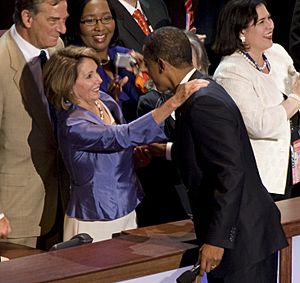
Pelosi has long supported LGBT rights. In 1996, she voted against the Defense of Marriage Act, and in 2004 and 2006, she voted against the proposed Federal Marriage Amendment, which would amend the United States Constitution to define marriage federally as being between one man and one woman, thereby overriding states' individual rights to legalize same-sex marriage. Pelosi supports the Equality Act, a bill that would expand the federal Civil Rights Act of 1964 to ban discrimination based on sexual orientation and gender identity. In 2019, she spoke in Congress in favor of the bill and called for ending discrimination against LGBT people. Pelosi also opposes Trump's transgender military ban.
Pelosi opposed the welfare reform President Bush proposed as well as reforms proposed and passed under President Clinton. She also opposed the tax reform signed by Trump in December 2017, calling it "probably one of the worst bills in the history of the United States of America ... It robs from the future [and] it rewards the rich ... and corporations at the expense of tens of millions of working middle-class families in our country."
In 1999, Pelosi voted against displaying the Ten Commandments in public buildings, including schools. She voted for the No Child Left Behind Act, which instituted testing to track students' progress and authorized an increase in overall education spending.
In 2019, Pelosi said climate change was "the existential threat of our time" and called for action to curb it. She has supported the development of new technologies to reduce U.S. dependence on foreign oil and remediate the adverse environmental effects of burning fossil fuels. Pelosi has widely supported conservation programs and energy research appropriations. She has also voted to remove an amendment that would allow for oil and gas exploration in the Arctic National Wildlife Refuge.
Pelosi has blocked efforts to revive offshore oil drilling in protected areas, reasoning that offshore drilling could lead to an increase in dependence on fossil fuels.
Pelosi was instrumental in passing the Patient Protection and Affordable Care Act of 2010. She was a key figure in convincing Obama to continue pushing for health-care reform after the election of Massachusetts Senator Scott Brown in a January special election—a defeat seen as potentially fatal to Democratic reform efforts. After delivering 219 votes in the House for Obama's health-care package, Pelosi was both praised and heckled as she made her way to Capitol Hill.Pelosi has voted to increase Medicare and Medicaid benefits.
Pelosi stands in favor of increased background checks for potential gun owners, as well as the banning of assault weapons.
Electoral history
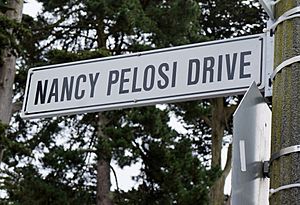
Pelosi's only close race so far has been in the special election to succeed U.S. Representative Sala Burton after her death in February 1987. Pelosi defeated San Francisco Supervisor Harry Britt in the Democratic primary with 36 percent of the vote to his 32 percent, then Republican Harriet Ross by more than 2-to-1. Since then, Pelosi has enjoyed overwhelming support in her political career, collecting 76 and 77 percent of the vote in California's 5th congressional district 1988 and 1990. In 1992, after the redistricting from the 1990 census, Pelosi ran in California's 8th congressional district, which now covered the San Francisco area. She has continued to post landslide victories since, dropping beneath 80 percent of the vote only three times in general elections. After redistricting from the 2010 census, Pelosi ran in California's 12th congressional district, which she represented for the next decade. Due to the 2020 United States redistricting cycle from the 2020 census, Pelosi now represents California's 11th congressional district, which covers San Francisco.
Personal life
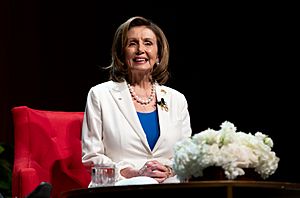
Nancy D'Alesandro met Paul Francis Pelosi while she was attending college. They married in Baltimore at the Cathedral of Mary Our Queen on September 7, 1963. They then moved to New York, followed by a move to San Francisco in 1969, where her husband's brother Ronald Pelosi was a member of the City and County of San Francisco's Board of Supervisors.
Nancy and Paul Pelosi have five children, including Christine and Alexandra, and nine grandchildren. Alexandra, a journalist, covered the Republican presidential campaigns in 2000 and made a film about the experience, Journeys with George. In 2007, Christine published a book, Campaign Boot Camp: Basic Training for Future Leaders.
Pelosi resides in the Pacific Heights neighborhood of San Francisco. Her 2016 financial disclosure report lists among her assets a combined home and vineyard in St. Helena, California, two commercial buildings in San Francisco, and a townhouse in Loomis, California. In January 2021, her San Francisco home was vandalized with graffiti, messages of "[c]ancel rent" were left on her garage, along with fake blood and a severed pig's head.
Financial status
Pelosi's husband, Paul, is a wealthy investor and the primary source of the couple's wealth. In 2009, OpenSecrets estimated Pelosi's net worth at $58 million, making her the 13th-wealthiest member of Congress. In 2014, OpenSecrets reported Pelosi's net worth had almost doubled, to about $101 million, making her the 8th-wealthiest. Business Insider reported that Pelosi's net worth was $26.4 million in 2012 and made her the 13th-richest member of Congress. In 2018, Roll Call estimated Pelosi's net worth at $16.0 million, making her the 30th-wealthiest member.
Roll Call said Pelosi's earnings are connected to her husband's heavy investments in stocks that include Apple, Disney, Comcast and Facebook. Roll Call reported that the couple have $13.46 million in liabilities including mortgages on seven properties. According to Roll Call, Pelosi and her husband hold properties "worth at least $23 million, including a St. Helena vineyard in Napa Valley worth at least $5 million."
As of 2021, Pelosi's net worth was valued at $120 million, making her the 6th richest person in Congress. According to journalist Glenn Greenwald, the Pelosis have traded $33 million worth of tech stocks over the past two years, including Apple, Amazon, Microsoft, Facebook, and Google stocks. In May and June 2021, Pelosi's husband purchased stocks in tech companies such as Alphabet, Amazon, and Apple, netting a gain of $5.3 million. This occurred even while Speaker Pelosi was working on anti-trust legislation to better regulate the tech industry. The CEO of Apple, Tim Cook, had called Pelosi to lobby her in opposition to the new regulations. Pelosi opposes increasing regulations on stock trades by members of congress, stating that "we're a free market economy" and congresspeople "should be able to participate in that". This comment drew strong criticism, including from Democrats who favor banning stock trades by members of Congress.
Involvement in Italian-American community
Pelosi is a board member of the National Organization of Italian American Women. She served for 13 years as a board member of the National Italian American Foundation (NIAF). In 2007, she received the NIAF Special Achievement Award for Public Advocacy and remains involved in the foundation.
Catholic church
..... Although she thought it was "lovely" that she had five children in a little over six years, she argued that "It's a woman's right to make her own choices with her family, her God, her doctor."
.....
On June 29, 2022, Pelosi received Communion at a Papal Mass presided over by Pope Francis in Rome at St. Peter's Basilica.
Home invasion
In October 2022, while Pelosi was in Washington, D.C., an intruder entered her San Francisco home demanding to know her whereabouts, and attacked her husband, Paul Pelosi, with a hammer. Police arrested a suspect, 42-year-old David DePape, at the scene. He has been charged federally with attempting to kidnap Nancy Pelosi and assaulting a relative of a federal official, as well as six state charges.
Health
In December 2024, Pelosi was hospitalized after fracturing her hip while falling down stairs in high heels during an official trip to Luxembourg. She was there as part of a bipartisan congressional delegation to observe the 80th anniversary of the Battle of the Bulge. On December 14, she underwent hip replacement surgery at Landstuhl Regional Medical Center, a U.S. military hospital in Germany.
Books
At the Internet Archive (registration required).
Honors and decorations
See also
 In Spanish: Nancy Pelosi para niños
In Spanish: Nancy Pelosi para niños
- Electoral history of Nancy Pelosi
- List of female speakers of legislatures in the United States
- Women in the United States House of Representatives


